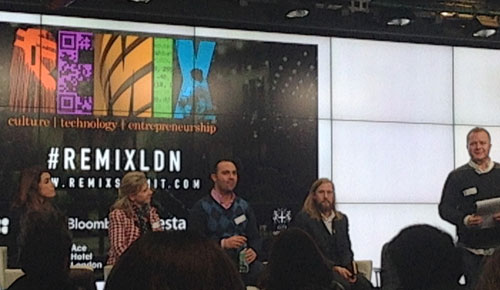
Remix conference 2013
Last week Head of Web Team Emma Allen and I attended a two-day conference at Google on Culture, Technology and Entrepreneurship. We listened to inspirational speakers from across the wide-ranging ‘cultural sector’, from the likes of the Tate, the Southbank Centre and Punchdrunk, to the Cultural Institute at Google itself. We got involved in panel debates on digital innovation, building online communities and making big ideas happen. Pitched at a high level, the conference allowed us all to take a step back from our day-to-day work, examine the current relationship between culture and technology, and consider the seemingly endless opportunities for the future.
While my head is still swirling with ideas, I thought I’d pull out some of the key themes that resonated throughout the two days.
Disruption
From challenge comes opportunity… Technology has always been a disruption – whether it’s a new way of consuming music making the former redundant, or television pushing out radio. We are living in a world of constant digital change and disruption, which challenges us to change our ways of thinking and working. Hannah Nicklin from Albow even spoke of ‘disrupting values’ with her new website Thisison – in passing around a ‘digital hat’ into which users could offer money, time or words, economic thinking is being applied to other value patterns.
Message: Disruption is necessary for evolution – embrace it and find ‘disruptive solutions’!
Collaboration
This was at heart of almost every session – the idea of creating a mutually beneficial ‘open source’ culture of collaboration. Whether this is between different industries (eg arts and technology), large and small businesses, whether money exchanges hands or just content and ideas, partnerships are seen as crucial for moving forwards. Many large cultural institutions are now working with small tech start-ups in East London’s own Silicone Valley, for instance, affording fresh perspectives and ways of working.
Message: Collaborate with people who are not like you.
Get your hands dirty & experiment. Work with believers & doers. Unexpected content makes you smile. Make it relevant & personal #REMIXLDN
— Sarah Leech (@sarahmleech) December 4, 2013
Experimentation
Don’t be afraid of ‘ugliness’, Matt Webb from Berg Studio told us at the beginning of day one. Do not focus on perfection from the outset – experiment, embrace any mistakes you make and learn from them.
Message: Try out lots of ideas for a higher chance of success in the end – ‘fail fast!’

Jude Kelly, Artistic Director at Southbank Centre, delivering an inspiring key note speech
Starting small
This abides by the same principle as above – don’t worry about scale straightaway. A phrase that keeps cropping up is a ‘minimum viable product’ – this encourages organisations to focus on a small product area or feature, launch with this and iterate. We have already adopted this model at The National Archives with our website re-design, focusing on updating top-level pages, launching them first Beta and making changes according to user feedback.
Message: Start small and scale up – start up, stand up and stay up

Panel on 'Experience Economy', including representatives from Time Out, Punchdrunk, V&A, The School of Life and Tripadvisor
Participation and self-curation
Digital is democratic; it removes institutional boundaries and allows all sorts of different audiences to engage with culture. Audiences are no longer passive, they increasingly want an experience, get involved in making their own art. From the David Bowie exhibition at the V&A which used sound and vision to turn the visitor into an audience member, to the Lichtenstein exhibition at the Tate which had people painting their faces and uploading photos to online galleries to get involved, curation is increasing being handed over to the audience. People also want to consume in their own time, when and where they want – how can you make your services on-demand?
Message: 77% of people are creating content online – give audiences a platform to get involved.
Genuine passion
You need to love your online site as much as your physical site. Not only that, but you need to love your brand. There was a bit of a debate in one of the panels around the notion of ‘passion branding’ and making the audience fall in love with your organisation/product – what came out of this was simply that as long you are coming from an authentic point of view and you believe in the work you are doing, your audience will find that emotional connection and follow you.
It’s refreshing to take a step back sometimes and remind ourselves why we do the job that we do and how we can continue to improve the services we offer. There was a lot of excitement and dynamism in the room, and it was truly infectious.
I’m interested to hear other people’s experiences of working with technology in the cultural sector. Have you been a part of successful collaboration? What has and hasn’t worked well for you?
Thanks for such an inspiring blog. I am sitting in Starbucks after work and have just read this on my iPad. It’s not often one. bumps into a ‘makes you want to get out of your seat and comfort zone’ piece! While the archive profession is often perceived as being conservative, it is robust and it’s future lies in investing in fluid and brave thinking like this. For example, “Get your hands dirty & experiment. Work with believers & doers. Unexpected content makes you smile. Make it relevant & personal” and “Try out lots of ideas for a higher chance of success in the end – ‘fail fast!’” Daring! More please!